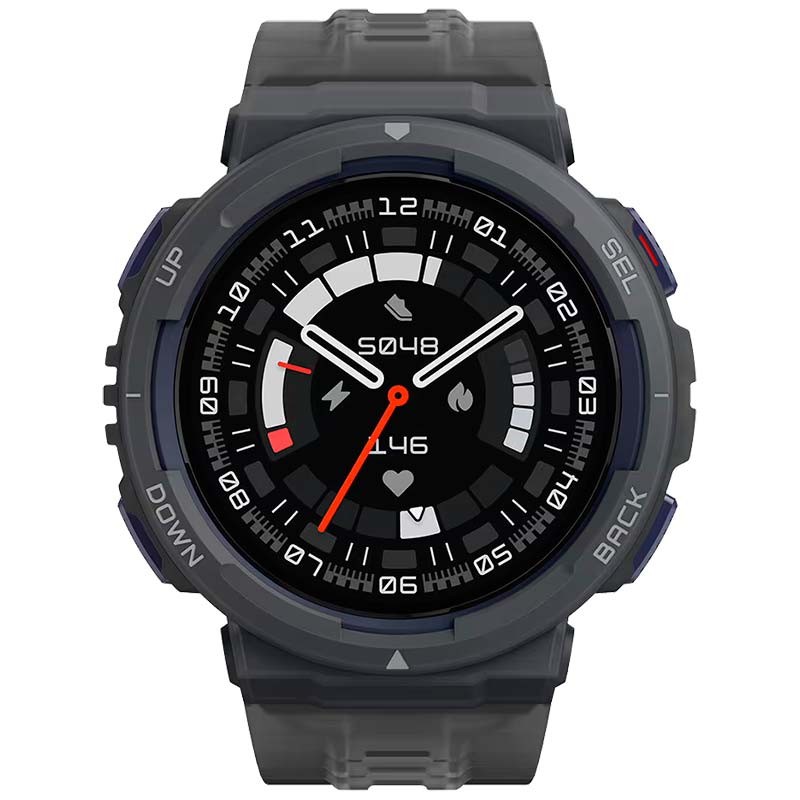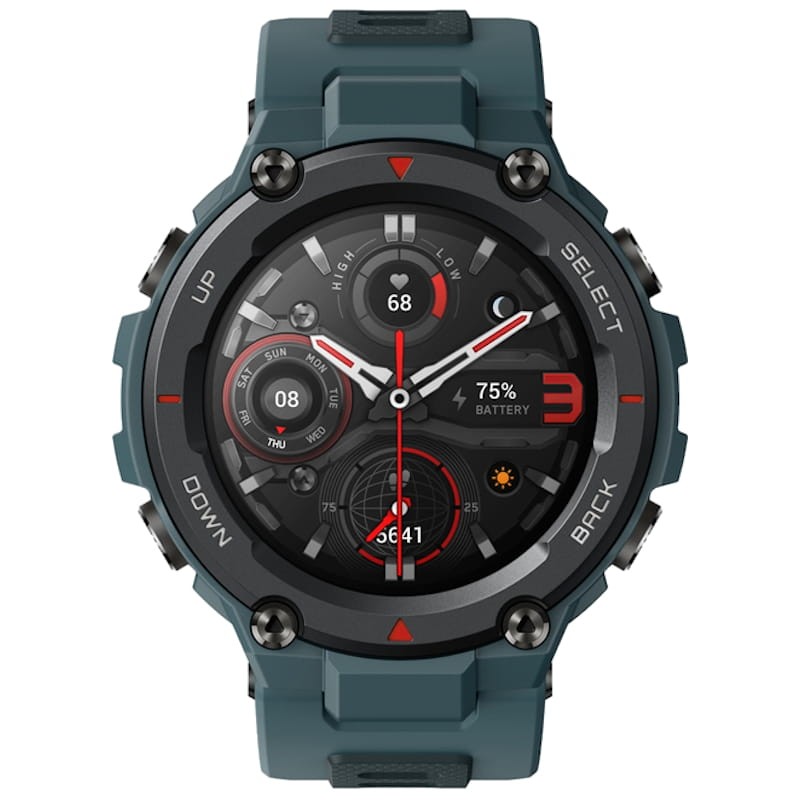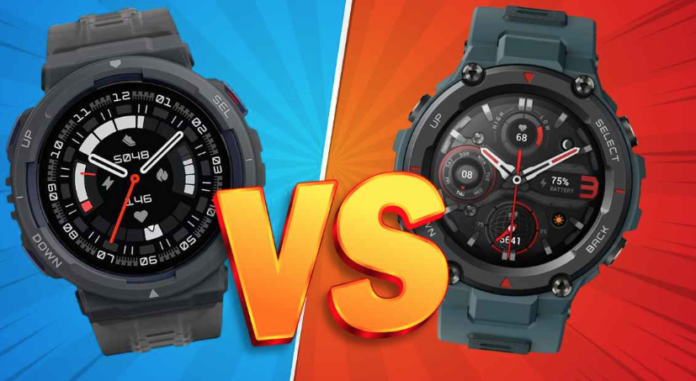Nowadays, smartwatches have become essential tools for those who want to lead an active and healthy lifestyle. Among the most outstanding options on the market are the Amazfit T-Rex Pro and the Amazfit Active Edge .
Both devices offer attractive features, but they are designed for different types of users and activities. We are going to compare these models in a comparison , analyzing their specifications and features to determine which one is best for you according to your needs. Remember that at Powerplanet , we always think of you.
Comparison between Amazfit Active Edge and Amazfit T-Rex Pro
| Amazfit T-Rex Pro | Amazfit Active Edge | |
|---|---|---|
| Design | Rugged, military, ideal for outdoors | Lightweight, modern, ideal for everyday use |
| Dimensions | 47.7 x 47.7 x 13.5 mm, 60 g | 42.3 x 42.3 x 10.8 mm, 34 g |
| Screen | 1.3-inch AMOLED, 360 x 360 pixels | 1.28-inch AMOLED, 416 x 416 pixels |
| Water resistance | 10 ATM | 10 ATM |
| Certification | MIL-STD-810G (military resistance) | No military certification |
| Sports modes | More than 100 modes | More than 130 modes |
| GPS | GPS + GLONASS + Galileo | GPS + GLONASS |
| Sensors | Heart rate, SpO2, sleep tracking | Heart rate, SpO2, sleep tracking |
| Autonomy | Up to 18 days (normal use), 40 hours (GPS) | Up to 16 days (normal use) |
| Notifications | Calls, messages, apps | Calls, messages, apps |
| Compatibility | Android and iOS | Android and iOS |
Design and Construction
The Amazfit Active Edge offers a more urban and lightweight design , with dimensions of 46.62 x 46.62 x 12 mm and a weight of 34 g. Its 1.32 – inch TFT screen offers a resolution of 360 x 360 pixels, although the display quality is not comparable to the AMOLED screen of the T-Rex Pro.
The semi-transparent silicone strap gives it a modern touch and allows easy change with universal 22 mm straps. On the other hand, the Amazfit T-Rex Pro stands out for its rugged and military design . With dimensions of 47.7 x 47.7 x 13.5 mm and a weight of 59.4 g, it is made of polycarbonate, which gives it strength and durability. Its 1.3 – inch AMOLED display with a resolution of 360 x 360 pixels, protected by Corning Gorilla Glass , ensures clear viewing in any environment.


Resistance and Durability
The T-Rex Pro is known for its extreme durability. With a waterproof rating of 10 ATM , it can withstand depths of up to 100 meters. Additionally, it meets the military certification standards of MIL-STD-810G , which means it can withstand adverse conditions such as extreme temperatures, humidity, dust, and shock.
The Active Edge also has a water resistance of 10 ATM , making it suitable for aquatic activities. However, its construction is not as focused on extreme durability as the T-Rex Pro. It is designed for everyday use and sports activities, but not necessarily for extreme conditions.
Features and Sports Modes
The Active Edge offers over 130 sport modes , making it a versatile option for those who practice a variety of disciplines. Its built-in GPS and compatibility with multiple positioning systems ensure accurate tracking during outdoor activities.
It also includes heart rate, blood oxygen (SpO2) and stress monitoring functions, as well as sleep tracking. However, its primary purpose is more focused on daily activity and general well-being than intensive outdoor use.
The T-Rex Pro , on the other hand, is a smartwatch designed for adventurers and athletes. It offers more than 100 sports modes , including outdoor activities such as hiking, cycling, and swimming.
Its GPS positioning system is compatible with multiple satellites (GPS, GLONASS, BeiDou, Galileo, and A-GPS), ensuring accurate tracking of your journeys. In addition, it is equipped with advanced sensors such as the BioTracker 2 PPG heart rate monitor, the SpO2 sensor, and the SomnusCare sleep monitor, which analyzes the different stages of sleep.


Battery Life
The T-Rex Pro is equipped with a 390 mAh battery that offers a battery life of up to 18 days in normal use. However, if you use GPS, the battery life varies: up to 40 hours in power saving mode, 18 hours in standard mode and 9 hours in intensive mode.
On the other hand, the Active Edge has a slightly larger 370 mAh battery , with a battery life of up to 16 days in normal use. In economy mode, it can last up to 24 days, and in intensive use, around 10 days. With GPS activated, the battery life is around 20 hours.
Connectivity and Applications
The Active Edge uses Bluetooth 5.0 and is compatible with the same Zepp app . However, its focus is more on connectivity for health and fitness tracking, with options for customizing watch faces and widgets.
The T-Rex Pro also uses Bluetooth 5.0 BLE to connect to smartphones, allowing you to receive notifications of calls, messages, and apps. The Zepp app is compatible with Android 5.0 or higher and iOS 10.0 or higher devices, making it easy to sync data and track activities.
Why choose the Amazfit T-Rex Pro?
– Durability : If you are an adventure lover and need a device that can withstand extreme conditions, the T-Rex Pro is your best choice. Its rugged design and 10 ATM water resistance make it an ideal companion for outdoor activities.
– Advanced Features : With over 100 sports modes and advanced health sensors, you can track your workouts and fitness comprehensively.
Why choose the Amazfit Active Edge?
– Lightness and comfort : If you are looking for a smartwatch that you can wear all day without feeling it, the Active Edge is perfect. Its light weight and modern design make it an ideal accessory for everyday use.
– Versatility : With more than 130 sports modes and good battery life, it is ideal for training as well as for everyday life. In addition, its high-resolution screen will allow you to enjoy an excellent visual experience.
